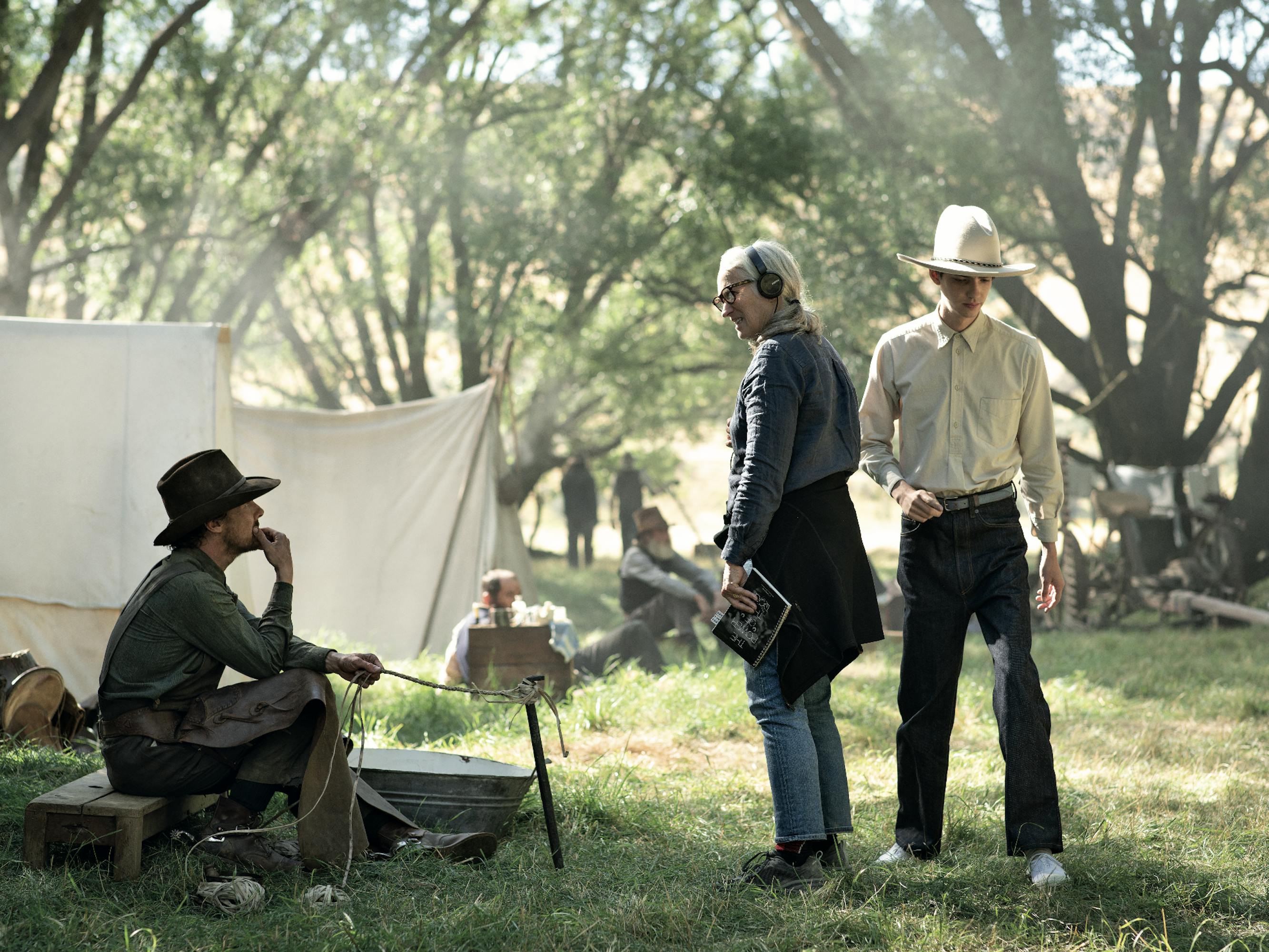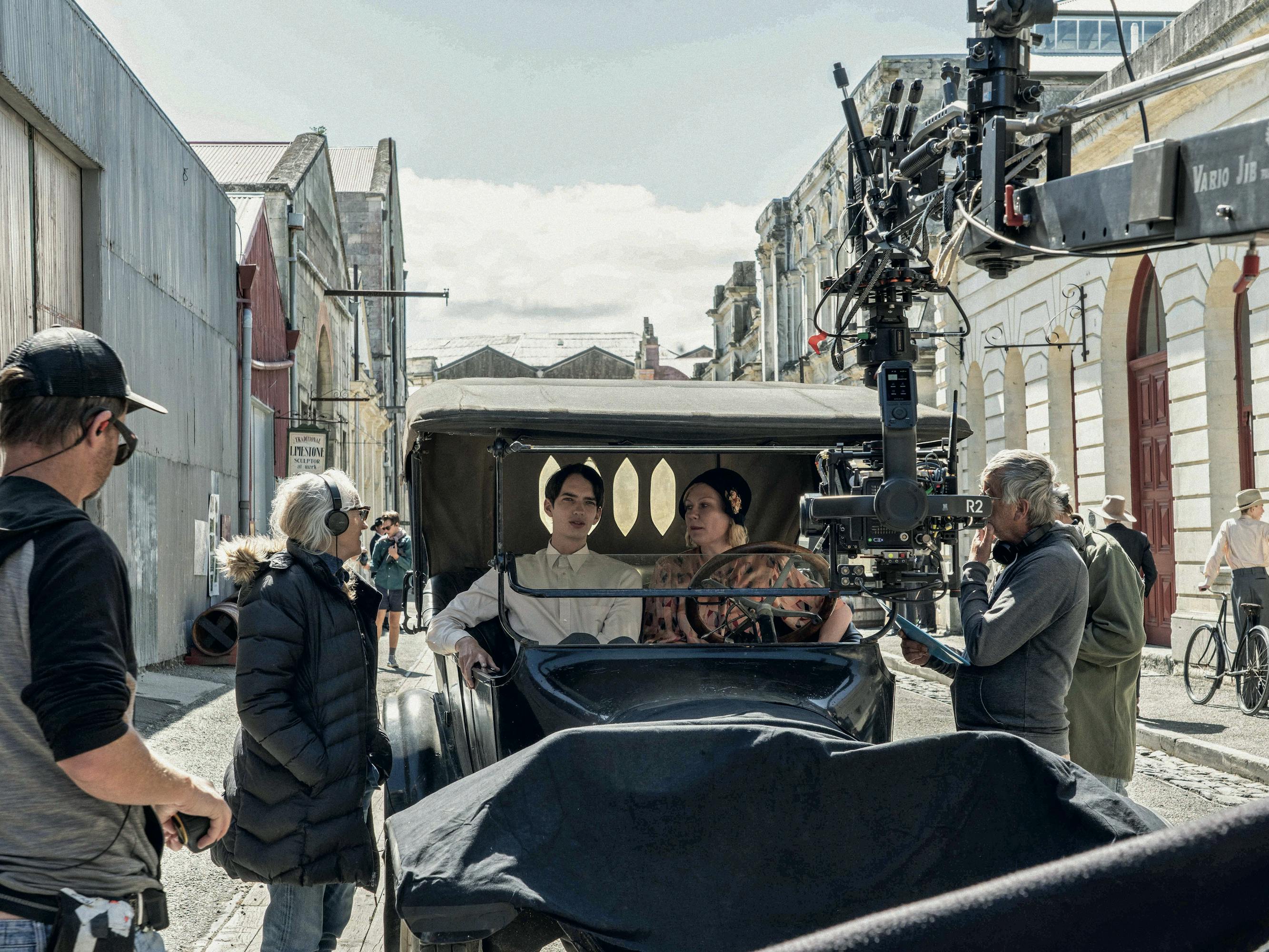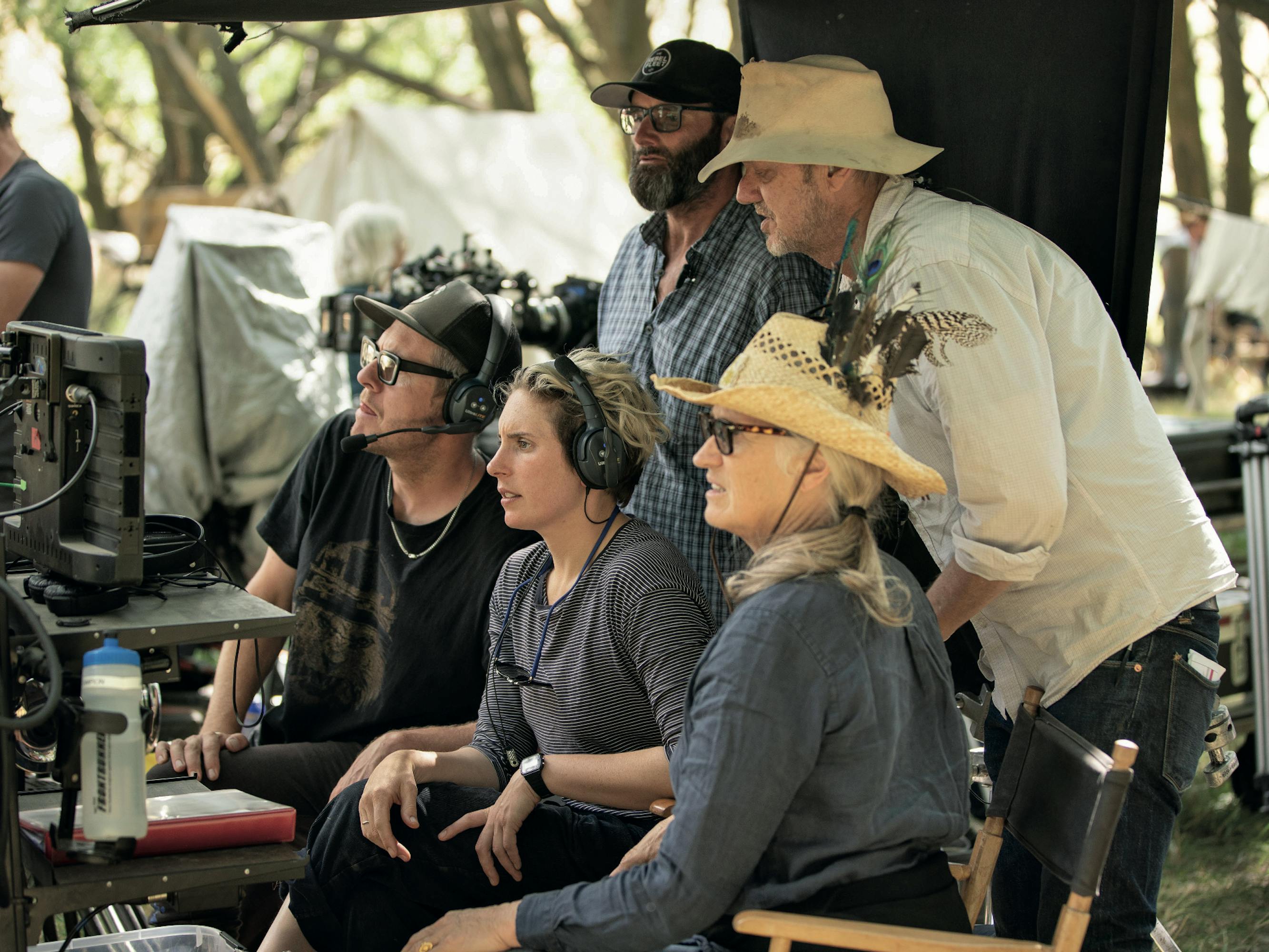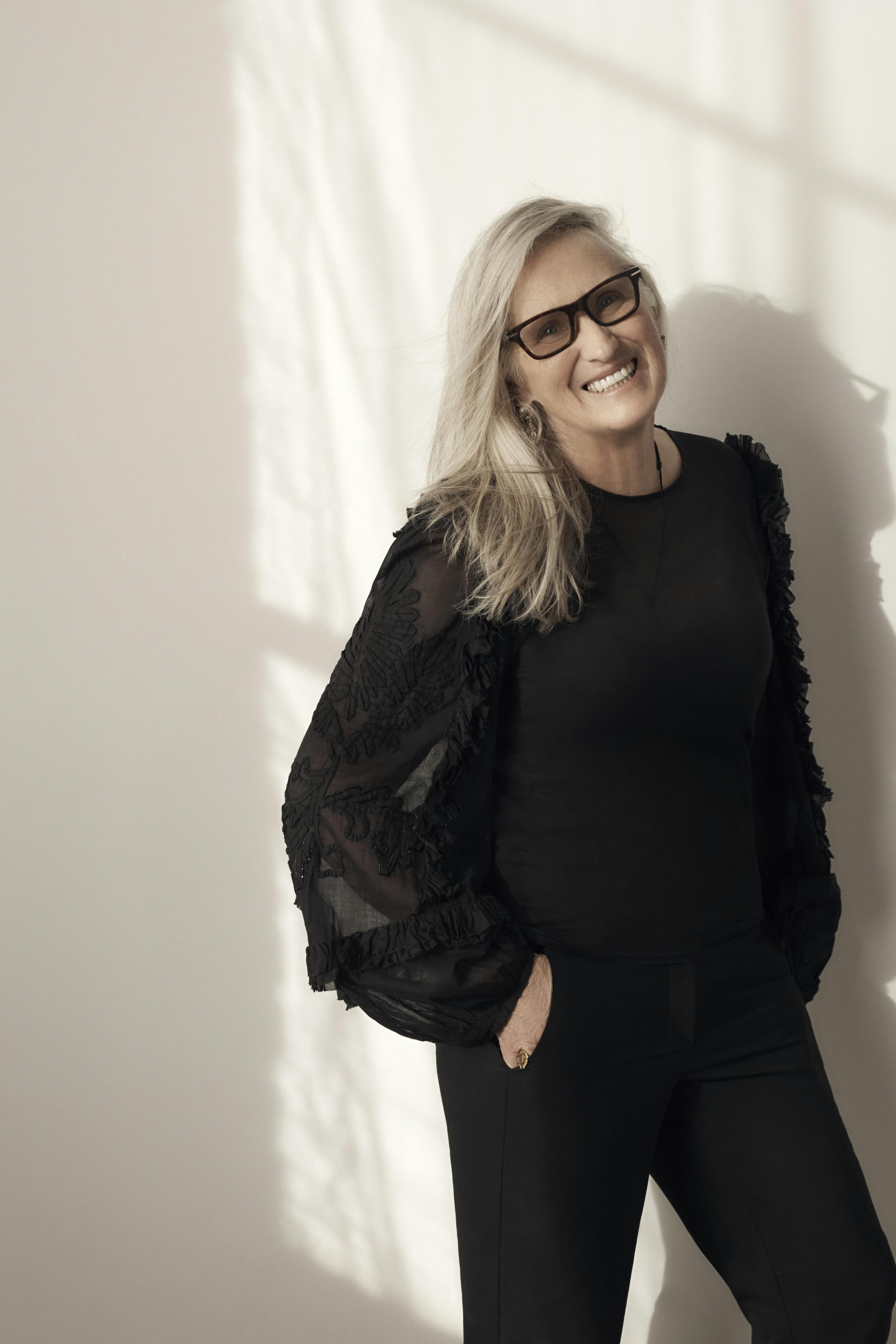The legend sits down with Kimberly Peirce to discuss The Power of the Dog.
From the moment she read Thomas Savage’s 1967 novel The Power of the Dog, Jane Campion knew she wanted to bring the richly plotted tale of love, obsession, and murder on the 1920s Montana frontier to the screen. But even for the venerable filmmaker, the ambitious project was daunting from the outset. “It’s just that amazing burden of imagination that is the work of directing really — when you begin to work with your script, or anybody’s script, and you start to know you’re going to have to manifest it somehow,” Campion says. “You have to imagine how it’s going to be. You have to imagine that sometimes without even knowing what your locations are, who your actors are. I actually think it’s pretty stressful.”
Only Campion could channel her stress into an unparalleled work of uncompromising artistry. With The Power of the Dog, her first feature since 2009’s Bright Star, Campion crafted a nail-biting drama, equal parts psychological thriller and mesmerizing character study. At its center is mercurial cattle rancher Phil Burbank (Benedict Cumberbatch), a coarse man whose contempt for others stems from an ugly marriage of arrogance and self-loathing.
When the story opens, Phil has a complicated relationship with his younger brother George (Jesse Plemons), at once sharing a bedroom with him and tormenting him endlessly. Lonely and neglected by his brother, George seeks out the company of a widow, Rose (Kirsten Dunst), and the pair soon marry. But when Rose and her adolescentson from her previous marriage, Peter (Kodi Smit-McPhee), move to the Burbank property, Phil begins a campaign of intimidation that drives Rose to alcoholism. However, the intellectual rancher is far kinder to Peter. In fact, Phil appears eager to impart some of the wisdom that he learned from his own mentor, Bronco Henry, to the young man. Quiet and observant — and out of place in the rural tableau — Peter proves a quick study, but his sudden interest in the ways of the farm and his growing closeness to mother’s antagonist are inscrutable.
Ever since its premiere at the 2021 Venice Film Festival, The Power of the Dog has won praise for its breathtaking visuals and insightful storytelling, reinforcing Campion’s long-standing reputation as a master filmmaker. Four years after releasing her debut feature, 1989’s Sweetie, she became the first woman to win the Palme d’Or at the Cannes Film Festival and the second woman ever to be nominated for the Best Director Academy Award, for 1993’s The Piano.
Campion recently sat down with Kimberly Peirce, the writer-director of the acclaimed films Boys Don’t Cry and Stop-Loss, to discuss what moves her about The Power of the Dog, what factors influence her approach to directing, and how, even now, Campion can feel uncertain when she first steps behind the camera on a new project. This is an edited version of their discussion.

Benedict Cumberbatch, Jane Campion, and Kodi Smit-McPhee
Kim Peirce: What grabbed you about the story? If you can go back to a seminal director moment, was there an image, a feeling?
Jane Campion: My journey with the material was based on this enormous respect that I had for the work that Thomas Savage did with his novel. It’s not easy to find a really great narrative. My first thing was, Oh my god, this is Thomas Savage’s life. You can feel it in the work, in the source material. It was such a sturdy base for me to begin with. No matter how we peeled this onion, this story, it never failed us. You never got to the bottom of it. There was always more, and it was always interesting. The story just works, and in a thematic way — in a way where the characters stretched and exposed and came to a crisis, and to an end. It’s a tragic portrait at heart.
KP: I’m amazed at what you distilled it into.
JC: The inspirations that I use . . . I love to go outside of film. When you just go, I’ll look at some films to inspire me, then you have that feeling of copying, and you don’t want to do that. I like to go to art. I looked at a lot of Lucian Freud, and I kept remembering the image from the novel of Phil bathing naked in the water. I remember thinking, Phil, I’m going to get your clothes off. You are beautiful underneath all that. You’re dangerous, and you’re beautiful.
KP: The intimacy of that moment — Phil, naked, caressing his body with the scarf that belonged to Bronco Henry — it’s incredible.
JC: Benedict shocked me when we did that work. When we were in the rehearsal room, and he was playing around with the scarf, he was, as Phil, a little bit irritated with it to begin with. He was saying, “This doesn’t feel very good.” I was like, “It’s silk, you know?” And he said, “Well, I don’t care what it is. It doesn’t feel very good.” I said, “Ben, I want you to find a way to love this silk scarf because it belonged to Bronco. That’s all you’ve got of him.

Jane Campion, The Power of the Dog crew, Kirsten Dunst, and Kodi Smit-McPhee
KP: And what did you get when you said that?
JC: He snarled a little bit. Quite often, with their props, actors can be really fussy because they feel like they’re having to lean into them; they have to be inspired by them, and they’re agitated by the fact that it might not feel absolutely perfect. I remember with Holly Hunter, when we did The Piano, the piano that we had was a very old style of table piano and actually really quiet. When she came in and she played it, she walked out of the rehearsal room. Later on, I rang her up and said, “Whatever is wrong, we’ll do something to fix it.” She said, “I’m not speaking in this film, and my piano is like a whisper.” I said, “Don’t worry. We’ll mic the piano. We’ll make it louder.”
My role is to try and just love [the actors] no matter what and know that they are out there — they’re going to be exposed. I see the courage that’s there; it is their talent, that capacity to get in that flow. But more often than not, you’re not in the flow. It’s not quite happening. You’re going to look a bit idiotic at times as an actor — you have to withstand a lot of mistakes. And I think that’s what directing is too; it’s like making mistake after mistake after mistake.
KP: Do you feel like you know when the flow is hitting and when it’s not? Can you tell when it’s there?
JC: I don’t know if actors always know. I did Bright Star when I was really wanting a more relaxed performance and was not accepting anything that I didn’t totally believe. I told myself, I’m not going to react unless I really believe what’s happening. It wasn’t a trick or anything; it was just honest. After two or three days of this, the cast was getting quite agitated. Then Ben [Whishaw] was just sitting at a desk or something, not doing anything, but looking at a spot on the ground. I noticed myself attentively watching him, and I thought, Oh, I believe this guy. Suddenly I was really interested in what was happening and just sort of said it. And then the actors started to be confident that it’s okay to do nothing really — to do nothing, to just be. Being is the most fascinating thing ever.
KP: Suspense is something that amazes me about your work. We know there’s a danger coming. We just don’t know when it’s going to spring at us.
JC: The thing with suspense is that you have to figure out how to calibrate it because it’s the engine of the piece. This one is a slow start, and then it accelerates. It’s to do with how much information you need to pull through it. If you’re got a very highly calibrated engine, it’s all story, and the narrative has a certain demand level — then you just don’t have room for Phil spending time with a scarf or something. I enjoy trying to figure out, What’s the correct engine for this kind of story?

Jane Campion and The Power of the Dog crew
KP: The vulnerability in this movie is remarkable. Kirsten wears it on her face — it’s so profound.
JC: I fall in love with Kirsten more deeply every day. She’s an actor I’ve loved since seeing her in The Virgin Suicides, Sofia [Coppola’s] beautiful work. She’s almost like Gena Rowlands — she has that sort of fated beauty. I think, as Kirsten gets older, it’s somehow more touching — the homely, loving, feminine presence of her, or the goodness that she seems to have. It hurts me that Rose is so gaslit and betrayed by Phil.
KP: Was there anything that you said to Kodi to shape his performance? His transformation is extraordinary.
JC: He says that I really pushed him, and that he was really grateful. You know, sometimes, you need a push. I suggested that he work with some Alexander Technique people to try to get the walk — it was described in the book as a stiff-legged walk — and to really explore that in his body, rather than something you put on top. I wanted him to find a way that it would feel essentially him. Kodi is a genius human. It was all there with him. For me, a lot of it is about getting to that place where there’s enough trust to be experimental, to try things, to be unafraid of failing together. Because again, I think a lot of directing is about failing.
KP: I’d love to hear the thoughts that come to you when you reflect back on that now.
JC: I can actually remember saying to my first assistant on the first day of shooting, “I just don’t know how to do this. I can’t imagine now how it can actually happen.” He said, “Jane, we’re going to do it the way we’ve always done it. We’re going to put the camera down. We’re going to put some people in front of it, and we’re going to shoot it.” I said, “Yes, that’s right. That’s how we do it.” It’s this miracle that happens when you’re thinking, I don’t really know what I’m doing. I don’t know why I’m here. Then you start to look through the lens, and you immediately go, Oh, no, that’s not right. This should be here. Something takes over and this sense of play and knowing comes through, which is my favorite thing — just feeling that excitement and playfulness on the set, the energy, the delight of images coming to life, and actors coming in and surprising you.
